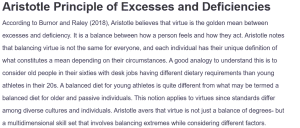Aristotle Categories for Fitness
Fitness as a Pursuit of Physical Well-being
Fitness is any exercise that improves physical strength, endurance, and well-being. Therefore, in its fundamental implication, fitness is a pursuit of power, agility, endurance, and balance. It remains one of the most generic categories of physical fitness, which embraces various methods of attaining the desired state of the body.
Fitness Categories by Activity Type
Fitness activities include cardio, training, flexibility, and balance exercises. Cardio is inclined towards heart-related stamina. Thus, the activity needs to last long; this is the case with exercising, such as running or cycling. Strength training involves resistance to develop the muscles, flexibility involves increasing the change of joint movement, and balance training, such as aerobics and yoga, supports core stability.
Settings of Fitness Practice
Settings is a way of classifying fitness in terms of fitness as measured by gym, home, outdoors, and class-based sessions. While gyms provide numerous targets, home workouts are perfect for variability, outdoor exercising allows one to combine workouts with nature’s impacts, and classes like spin create a group setting. Each setting tailors fitness to unique goals and preferences.
Intensity Levels in Fitness
Fitness can also be categorized by intensity, from low to moderate, high, and interval training. Low intensity involves activities such as walking or stretching and is greatly suitable for persons recovering from some ailment or those starting exercise sessions[1]. Moderate and high-
- Chittaranjan Andrade, “Physical Exercise and Health, 4: The Health Care Professional and Patient’s Guide to Understanding What to Do, How, and Why—Part 2,” The Journal of Clinical Psychiatry 84, no. 6 (December 11, 2023): 50670, https://doi.org/10.4088/JCP.23f15187.
intensity activities, like jogging or sprinting and interval training with varying paces , test endurance and contribute to effective calorie loss.
Fitness for Targeted Outcomes
Fitness can be categorized by outcome: weight loss, enhancing muscle mass, increasing flexibility, or stress relief[2]. Weight loss focuses on burning calories, while muscle building concentrates on building mass, flexibility on range of motion, and stress relief on the state of the mind by exercising the body.
2.David McCarthy and Aloys Berg, “Weight Loss Strategies and the Risk of Skeletal Muscle Mass Loss,” Nutrients 13, no. 7 (July 20, 2021): 2473, https://doi.org/10.3390/nu13072473.
Bibliography
Andrade, Chittaranjan. “Physical Exercise and Health, 4: The Health Care Professional and Patient’s Guide to Understanding What to Do, How, and Why—Part 2.” The Journal of Clinical Psychiatry 84, no. 6 (December 11, 2023): 50670. https://doi.org/10.4088/JCP.23f15187.
McCarthy, David, and Aloys Berg. “Weight Loss Strategies and the Risk of Skeletal Muscle Mass Loss.” Nutrients 13, no. 7 (July 20, 2021): 2473. https://doi.org/10.3390/nu13072473.\
ORDER A PLAGIARISM-FREE PAPER HERE
We’ll write everything from scratch
Question
This assignment is a little different, and I hope it will be fun for you.
In your two readings by Aristotle, posted to Canvas, you can see that Aristotle really enjoyed dividing things into categories, what defines Art? Science? Wisdom? Comedy? Tragedy? Aristotle tried to provide definitions for all of these, so that they could be judged on the correct terms.

Aristotle Categories for Fitness
For this discussion, I want you to create Aristotelian categories for a subject that you know very well. For example, if you love music, how might you categorize and define different genres of music? If you are an avid reader, how might you categorize and define the types of writing that you enjoy? If you enjoy working on cars, how would you categorize and define different types of cars, or car-owners? The possibilities here are endless, so if you want to double-check that you are on the right track, send me an email.
Readings:
- https://classics.mit.edu/
Aristotle/poetics.1.1.html - https://classics.mit.edu/
Aristotle/metaphysics.1.i.html

